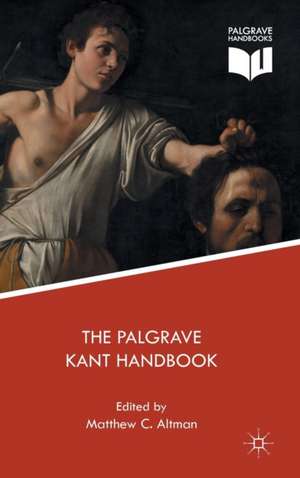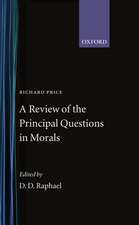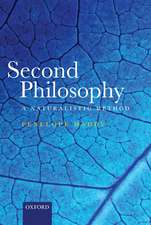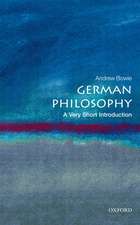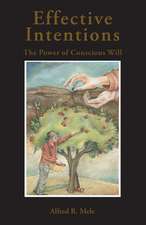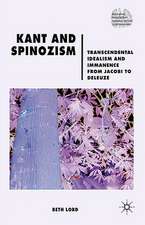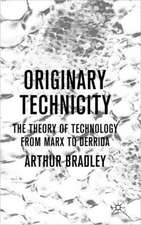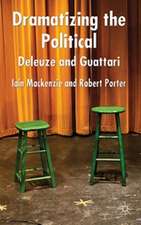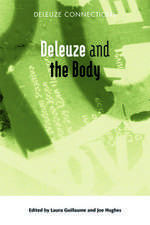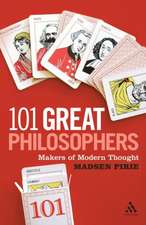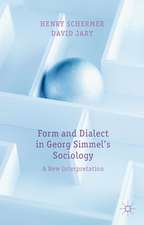The Palgrave Kant Handbook: Palgrave Handbooks in German Idealism
Editat de Matthew C. Altmanen Limba Engleză Hardback – 23 ian 2018
Key Features:
• Draws attention to the foundations of Kant’s varied philosophical insights — transcendental idealism, logic, and the bridge between theoretical and practical reason
• Considers hitherto neglected topics such as sexuality and the philosophy of education • Explores the immense impact of his ground-breakingwork on subsequent intellectual movements
Serving as a touchstone for meaningful discussion about Kant’s philosophical and historical importance, this definitive Handbook is essential reading for Kant scholars who want to keep abreast of the field and for advanced students wishing to explore the frontiers of the subject.
Preț: 2123.11 lei
Preț vechi: 2589.15 lei
-18% Nou
Puncte Express: 3185
Preț estimativ în valută:
406.31€ • 422.63$ • 335.43£
406.31€ • 422.63$ • 335.43£
Carte tipărită la comandă
Livrare economică 14-28 aprilie
Preluare comenzi: 021 569.72.76
Specificații
ISBN-13: 9781137546555
ISBN-10: 1137546557
Pagini: 1110
Ilustrații: XLIV, 851 p. 6 illus., 2 illus. in color.
Dimensiuni: 155 x 235 x 54 mm
Greutate: 1.42 kg
Ediția:1st ed. 2017
Editura: Palgrave Macmillan UK
Colecția Palgrave Macmillan
Seria Palgrave Handbooks in German Idealism
Locul publicării:London, United Kingdom
ISBN-10: 1137546557
Pagini: 1110
Ilustrații: XLIV, 851 p. 6 illus., 2 illus. in color.
Dimensiuni: 155 x 235 x 54 mm
Greutate: 1.42 kg
Ediția:1st ed. 2017
Editura: Palgrave Macmillan UK
Colecția Palgrave Macmillan
Seria Palgrave Handbooks in German Idealism
Locul publicării:London, United Kingdom
Cuprins
Contents.- Series Editor’s Preface.- Preface.- Notes on Contributors.- Note on Sources and Key to Abbreviations.- Introduction: Kant the Revolutionary: Matthew C. Altman.- Part I. Biographical and Historical Background.- 1. Kant’s Life: Steve Naragon.- 2. Kant and His Philosophical Context: The Reception and Critical Transformation of the Leibnizian-Wolffian Philosophy: Manuel Sánchez-Rodríguez.- Part II. Metaphysics and Epistemology.- 3. Transcendental Idealism: What and Why?: Paul Guyer.- 4. Noumenal Ignorance: Why, for Kant, Can’t We Know Things in Themselves?: Alejandro Naranjo Sandoval and Andrew Chignell.- 5. Kant’s Concept of Cognition and the Key to the Whole Secret of Metaphysics: Chong-Fuk Lau.- 6. Apperception, Self-Consciousness, and Self-Knowledge in Kant: Dennis Schulting.- Part III. Logic.- 7. The Place of Logic within Kant’s Philosophy: Clinton Tolley.- Part IV. Relation between Theoretical and Practical Reason.- 8. The Primacy of Practical Reason: Ralph C. S. Walker.- 9. A Practical Account of Kantian Freedom: Matthew C. Altman.- 10. Moral Skepticism and the Critique of Practical Reason: David Zapero.- Part V. Ethics.- 11. How a Kantian Decides What to Do: Allen W. Wood.- 12. Duties to Oneself: Oliver Sensen.- 13. Demandingness, Indebtedness, and Charity: Kant on Imperfect Duties to Others: Kate Moran.- 14. Kant and Sexuality: Helga Varden.- 15. Kant in Metaethics: The Paradox of Autonomy, Solved by Publicity: Carla Bagnoli.- Part VI. Aesthetics.- 16. Feeling the Life of the Mind: Mere Judging, Feeling, and Judgment: Fiona Hughes.- 17. On Common Sense, Communicability, and Community: Eli Friedlander.- 18. Immediate Judgment and Non-Cognitive Ideas: The Pervasive and Persistent in the Misreading of Kant’s Aesthetic Formalism: Jennifer A. McMahon.- 19. Sublimity and Joy: Kant on the Aesthetic Constitution of Virtue: Melissa McBay Merritt.- Part VII. Philosophy of Science.- 20. “Proper Science” and Empirical Laws: Kant’s Sense of Science in the Critical Philosophy: John H. Zammito.- 21. From General to Special Metaphysics of Nature: Michael Bennett McNulty (with Marius Stan) .- Part VIII. Philosophy of Religion.- 22. Kant on Faith: Religious Assent and the Limits to Knowledge: Lawrence Pasternack.- 23. The Fate of Religion within the Boundaries of Mere Reason: Martin Moors.- Part IX. Political Philosophy.- 24. The Critical Legal and Political Philosophy of Immanuel Kant: Howard Williams.- 25. A Cosmopolitan Law Created by Cosmopolitan Citizens: The Kantian Project Today: Soraya Nour Sckell.- 26. Kant’s Mature Theory of Punishment, and a First Critique Ideal Abolitionist Alternative: Benjamin Vilhauer.- Part X. Anthropology, History, and Education.- 27. Denkungsart in Kant’s Anthropology from a Pragmatic Point of View: Patrick R. Frierson.- 28. Kant on Emotions, Feelings, and Affectivity: Alix Cohen.- 29. The Philosopher as Legislator: Kant on History: Katerina Deligiorgi.- 30. Becoming Human: Kant’s Philosophy of Education andHuman Nature: Robert B. Louden.- Part XI. The Kantian Aftermath, and Kant’s Contemporary Relevance.- 31. Kant after Kant: The Indispensable Philosopher: Michael Vater.- 32. Kant, the Copernican Devolution, and Real Metaphysics: Robert Hanna.- 33. Contemporary Kantian Moral Philosophy: Michael Rohlf.- Conclusion: Kant the Philosopher: Matthew C. Altman.- Index.
Recenzii
Selected by Choice magazine as an Outstanding Academic Title for 2018
“A new generation of Kant scholars is on the rise, and this beautifully printed and consummately edited scholarly collection announces their ascendancy with distinctive fanfare. … The essays are extremely readable, impeccably annotated, and abundantly resourceful, so they will be useful both for novice readers finding their way through Kant’s notoriously difficult thicket of concepts and for established scholars seeking reference points sure to spark renewed debate. … Researchers in particular will find this book a critical touchstone.” (J. G. Moore, Choice, Vol. 55 (12), August, 2018)
“A new generation of Kant scholars is on the rise, and this beautifully printed and consummately edited scholarly collection announces their ascendancy with distinctive fanfare. … The essays are extremely readable, impeccably annotated, and abundantly resourceful, so they will be useful both for novice readers finding their way through Kant’s notoriously difficult thicket of concepts and for established scholars seeking reference points sure to spark renewed debate. … Researchers in particular will find this book a critical touchstone.” (J. G. Moore, Choice, Vol. 55 (12), August, 2018)
Notă biografică
Matthew C. Altman is Professor of Philosophy and Chair of the Philosophy & Religious Studies Department at Central Washington University, USA. He is the author of A Companion to Kant’s “Critique of Pure Reason” (2008) and Kant and Applied Ethics (2011), co-author of The Fractured Self in Freud and German Philosophy (2013), and editor of The Palgrave Handbook of German Idealism (2014).
Textul de pe ultima copertă
This remarkably comprehensive Handbook provides a multifaceted yet carefully crafted investigation into the work of Immanuel Kant, one of the greatest philosophers the world has ever seen. With original contributions from leading international scholars in the field, this authoritative volume first sets Kant’s work in its biographical and historical context. It then proceeds to explain and evaluate his revolutionary work in metaphysics and epistemology, logic, ethics, aesthetics, philosophy of science, philosophy of religion, political philosophy, philosophy of history, philosophy of education, and anthropology.
Key Features:
• Draws attention to the foundations of Kant’s varied philosophical insights — transcendental idealism, logic, and the bridge between theoretical and practical reason
• Considers hitherto neglected topics such as sexuality and the philosophy of education • Explores the immense impact of his ground-breakingwork on subsequent intellectual movements
Serving as a touchstone for meaningful discussion about Kant’s philosophical and historical importance, this definitive Handbook is essential reading for Kant scholars who want to keep abreast of the field and for advanced students wishing to explore the frontiers of the subject.
Key Features:
• Draws attention to the foundations of Kant’s varied philosophical insights — transcendental idealism, logic, and the bridge between theoretical and practical reason
• Considers hitherto neglected topics such as sexuality and the philosophy of education • Explores the immense impact of his ground-breakingwork on subsequent intellectual movements
Serving as a touchstone for meaningful discussion about Kant’s philosophical and historical importance, this definitive Handbook is essential reading for Kant scholars who want to keep abreast of the field and for advanced students wishing to explore the frontiers of the subject.
Caracteristici
Offers an accessibly structured approach to the most significant aspects of Kant’s varied philosophical insights Expands enquiry outside of themes explored by Kant to examine the impact of his groundbreaking work on intellectual history more broadly Provides a fresh platform for debate, through the inclusion of work by well-established as well as more junior scholars, on the relevance of Kant’s philosophy to contemporary work in metaphysics and ethics
